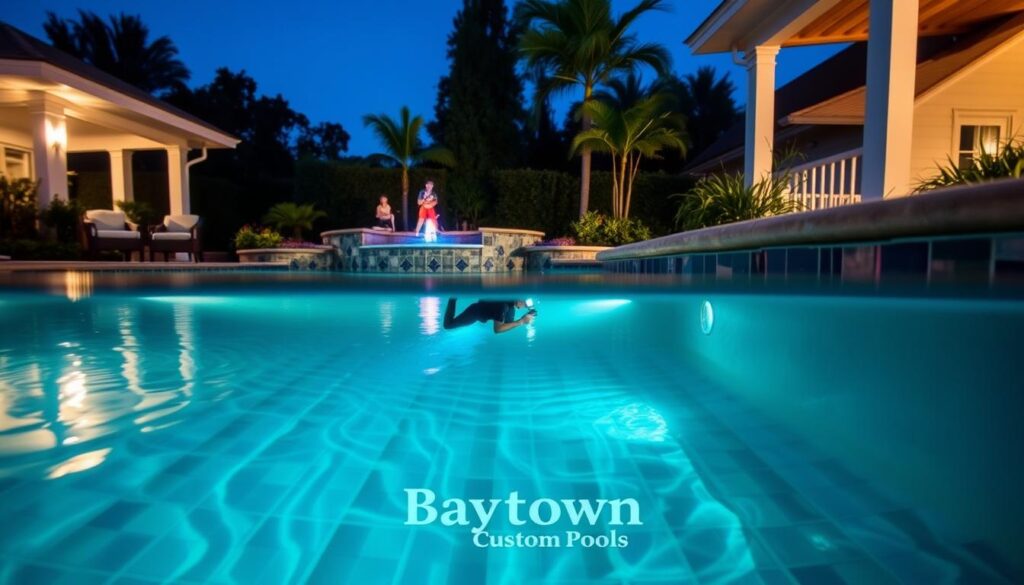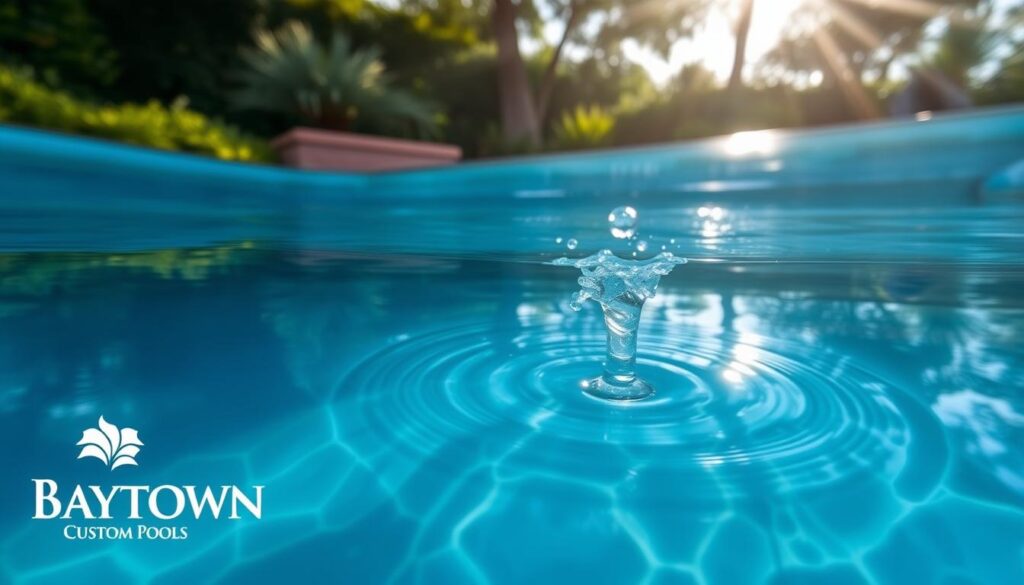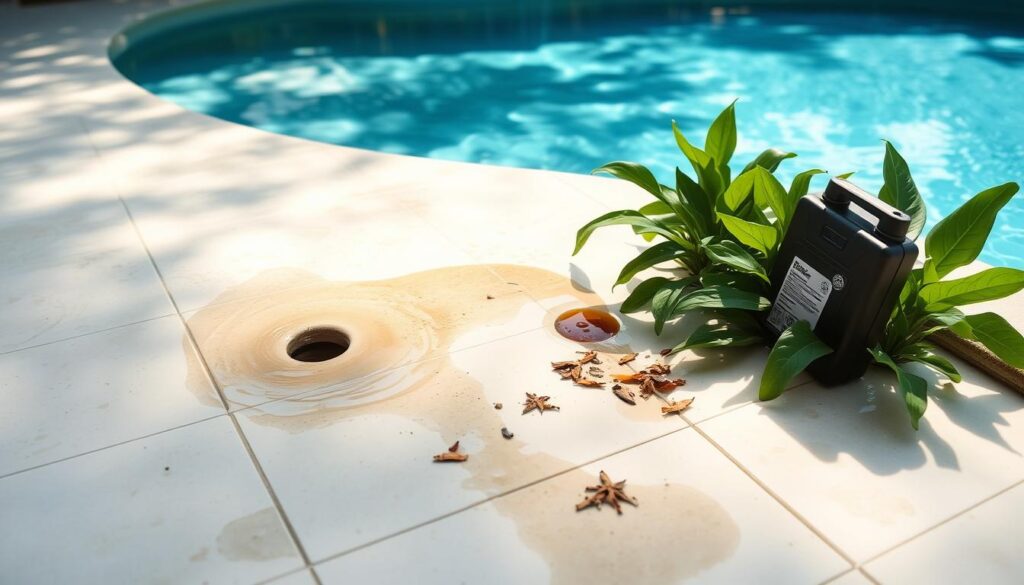Pool Leak Detection: Find and Fix Underwater Issues
Dealing with pool leaks can be tough for pool owners or contractors. Leaks can waste water, damage the pool, and cause more problems. This article will help you find and fix leaks in your pool.
Whether you have an inground, gunite, or concrete pool, we’ve got you covered. This guide will teach you how to spot and fix leaks. You’ll save water, money, and enjoy your pool without worries this season.

Key Takeaways
- Understand the common causes and potential consequences of pool leaks
- Identify the signs that your pool might have a leak
- Learn effective visual inspection techniques and professional leak detection methods
- Discover the best materials and methods for repairing pool leaks
- Implement preventive maintenance strategies to keep your pool in top condition
Understanding Pool Leaks: Causes and Consequences
Keeping a swimming pool can be rewarding but also comes with challenges. Pool leaks are a common problem. They can come from many causes and have big consequences if not fixed.
Common Reasons for Pool Leaks
Pool leaks can happen for many reasons. These include structural problems, plumbing issues, and natural wear. Some common causes are:
- Cracks in the pool’s liner or shell
- Damaged or faulty pool equipment, such as pumps or valves
- Deterioration of pool sealants and caulking
- Improper installation or construction of the pool
- Soil erosion or shifting foundation issues
Potential Damage from Undetected Leaks
Ignoring pool leaks can cause big problems. These include:
- Significant water loss, leading to higher utility bills and the need for more frequent refilling
- Damage to the pool’s structural integrity, including the foundation and surrounding landscape
- Mold and mildew growth, which can compromise the safety and hygiene of the pool area
- Increased risk of electrical hazards due to water infiltration
- Potential for costly repairs or even the need to completely resurface or replace the pool
Spotting the signs of a pool leak and fixing it fast is key. Knowing the common causes and effects of pool leaks helps prevent and fix these issues. This keeps your pool safe and enjoyable for years.

Signs Your Pool Might Have a Leak
Spotting signs of pool leak is key to fixing underwater problems. As a pool owner, watching for pool leak indicators is important. Catching these signs of pool leak early helps you fix the issue before it gets worse.
One clear sign of pool leak is water loss without explanation. If your pool’s water level drops, even when the pump is off, it might mean a leak. Also, damp spots around the pool can show water is leaking through cracks or holes.
- Unexplained water loss
- Damp areas around the pool
- Changes in water pressure
- Cracks or damage to the pool’s surface
- Algae growth or discoloration in the water
Changes in water pressure can also hint at a pool leak. If water flow or pressure seems off, it might mean a plumbing issue or a leak.
By keeping an eye out and fixing these pool leak indicators quickly, you can save money and keep your pool in good shape. Remember, the sooner you detect and fix a pool leak, the better it will be.

Locating the Source of the Leak
Finding the source of a pool leak is the first step. You can use visual checks and professional tools to do this. Knowing your options helps you choose the best way to fix the leak.
Visual Inspection Techniques
Looking for cracks or holes in the pool can give you clues. Also, watching the water level can show if there’s a leak. These signs can help you find where the leak might be.
Professional Leak Detection Methods
Professional pool leak detection techniques offer a deeper look. They use tools like ultrasound and special cameras. They also use dye and pressure tests to find leaks.
- Ultrasound leak detection
- Visual pool leak inspection using specialized cameras
- Tracer dye injection to pinpoint the source
- Pressure testing to identify leaks
These methods help find leaks fast. This means repairs can start sooner, preventing more damage.
Choosing to inspect yourself or get a pro’s help is important. The key is to act fast to avoid bigger problems. Finding the leak early helps fix it right and keeps your pool in good shape.
Pool Leak Detection: A Comprehensive Approach
Finding and fixing pool leaks needs a detailed, multi-step plan. By using visual checks, water tests, and high-tech tools, pool owners can find leaks well. This ensures they know exactly where the problem is.
The multi-step pool leak identification starts with a close look at the pool. They check the surface, equipment, and around for damage or water loss. This first step helps find where the leak might be.
- Do a dye test to find where the leak starts. Add a safe dye to the water and see where it shows up. This gives clues about the leak’s spot.
- Do a pressure test to find cracks or weak spots in the pool. This tool shows exactly where the leak is.
- Use advanced tech like thermal imaging or ultrasonic leak detection. These tools find leaks, even in tricky spots.
By using a detailed method for pool leak detection, owners can fix the real problem. This stops more damage and keeps the pool safe for a long time.
Repairing Pool Leaks: Materials and Methods
Fixing pool leaks needs a detailed plan. The right materials and methods are key to a successful repair. Pool owners can choose from patching, sealing, resurfacing, or replastering to fix their pools.
Patching and Sealing Leaks
For small leaks, patching and sealing is a good choice. It uses special materials like epoxy or polyurethane to fix cracks or holes. These materials stick well to the pool’s surface, making a strong seal.
Resurfacing and Replastering Options
For bigger leaks or a worn-out pool surface, resurfacing or replastering is better. This involves removing the old surface and putting on a new one. You can use plaster, fiberglass, or concrete. It fixes leaks and makes the pool look better and last longer.
Choosing between patching and sealing or resurfacing depends on the leak’s size and the pool’s condition. Talking to a pool expert can help decide the best fix for your pool.
Preventive Maintenance for Long-Lasting Pools
To keep your pool in great shape, you need to act early. Regular pool maintenance, checks, and watching the pool are key. They help spot problems before they get expensive. With the right steps, your pool can last longer and be a fun place for years.
Regular Inspections and Monitoring
It’s important to check your pool often. Look at the surfaces, equipment, and water to find any issues. This way, you can fix small problems before they get big.
Keeping an eye on your pool is also vital. Know about the water levels, chemical balance, and how well it’s working. This lets you fix any problems fast and keep the pool perfect.
- Schedule regular inspections with a qualified pool professional
- Regularly test and monitor your pool’s water chemistry
- Address any issues or imbalances promptly to prevent further damage
Being proactive with pool maintenance protects your investment. It keeps your pool in excellent shape for many years.
Hiring Professional Pool Leak Detection Services
When you have a pool leak, getting help from professional pool leak detection services is crucial. These experts have the skills, tools, and methods to find and fix the leak.
Choosing a professional pool leak detection company has many benefits. They use special tools like infrared cameras and dye-testing kits. These tools help them find the leak, even in tricky spots. This saves you time and money by fixing only what needs to be fixed.
- Expertise in Leak Identification: These services know how to find and fix pool leaks. They do a thorough job to make sure the problem is solved right.
- Efficient Repair Solutions: They know the best ways to fix the leak. This could be patching, sealing, or resurfacing. They make sure the fix works well and lasts.
- Specialized Equipment: They use the latest tools and technologies. This includes infrared cameras and dye-testing kits. These tools help them find the leak exactly.
- Reliable and Trustworthy: Good pool leak detection companies are dependable. They make sure your pool is safe and lasts a long time.
Working with professional pool leak detection services means your pool is in good hands. They help keep your pool in top shape. This way, you can enjoy swimming without worries for many years.
Pool Leak Detection: Cost and Value
Finding and fixing pool leaks is key to keeping your pool in good shape. The pool leak detection cost might seem high at first. But, the long-term value of pool leak detection is much greater.
Professional services for finding pool leaks cost between $150 and $500. This price depends on your pool’s size and the leak’s complexity. It covers the cost of the expert’s time and special tools needed to find the leak accurately. Early detection helps avoid bigger problems and expensive fixes later.
Ignoring pool leaks can cause serious issues. These include damage to the pool’s structure, wasting water, and growing harmful mold and mildew. By choosing pool leak detection, you protect your pool’s physical state. You also save money on repairs and keep your investment safe.
Also, finding leaks early saves water and cuts down on utility bills. This means you get a good return on your investment. Regular checks and maintenance through pool leak detection services can make your pool last longer. This lets you enjoy it for many years.
Conclusion
Addressing leaks in your pool is key to keeping it healthy and lasting long. You now know how to find and fix leaks. This guide has given you the tools to do so.
Keeping up with maintenance and acting fast is important. It helps avoid expensive repairs and keeps your pool in good shape. Regular checks and quick fixes can save you a lot of trouble.
For a free quote on our pool leak detection and repair services, call Baytown Custom Pools at (346) 567-6456. Our team is ready to help you keep your pool in top shape. Enjoy a worry-free pool experience with our help.
FAQ
What are the most common causes of pool leaks?
Pool leaks often come from cracks in the shell or liner. Plumbing problems like broken pipes also cause leaks. Age and improper installation can wear down the pool, leading to leaks.
How can I tell if my pool has a leak?
Signs of a leak include losing water without explanation and finding damp spots around the pool. Changes in water pressure and visible damage to the pool are also indicators.
What are the potential consequences of an undetected pool leak?
Ignoring a leak can cause a lot of water loss and higher bills. It can also harm the pool’s foundation and nearby structures. Finding and fixing leaks quickly is key to avoiding bigger problems and expensive fixes.
What are the different methods for detecting pool leaks?
Finding leaks involves looking for them, testing the water, and using advanced methods like dye testing. Experts use special tools and know-how to find leaks accurately.
How can I repair a pool leak?
Fixing a leak can be simple or complex, depending on the size and location. Small cracks might just need sealing, while bigger issues might require resurfacing or replastering.
How important is regular pool maintenance in preventing leaks?
Keeping up with pool maintenance is crucial. It helps spot and fix leaks early. This way, you can avoid wasting water and prevent damage to your pool.
When should I consider hiring professional pool leak detection services?
If you can’t find the leak yourself, or if repairs don’t work, get help. Professional services ensure a correct diagnosis and proper repair.
How much does pool leak detection and repair typically cost?
The cost varies based on the leak’s severity and the needed repairs. But, getting professionals to fix it can save you money by avoiding more damage and water loss.

